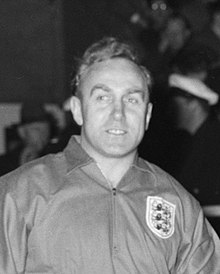Billy Wright (footballer born 1924)

Billy Wright
|
|||
| Personal information | |||
|---|---|---|---|
| Full name | William Ambrose Wright | ||
| Date of birth | 6 February 1924 | ||
| Place of birth | Ironbridge, Shropshire, England | ||
| Date of death | 3 September 1994 (aged 70) | ||
| Place of death | London, England | ||
| Playing position | Centre half | ||
| Senior career* | |||
| Years | Team | Apps | (Gls) |
| 1939–1959 | Wolverhampton Wanderers | 490 | (13) |
| National team | |||
| 1948 | England B | 1 | (1) |
| 1946–1959 | England | 105 | (3) |
| Teams managed | |||
| 1962–1966 | Arsenal | ||
| * Senior club appearances and goals counted for the domestic league only. |
|||
William Ambrose "Billy" Wright, CBE (6 February 1924 – 3 September 1994) was an English footballer, who spent his whole career at Wolverhampton Wanderers. The first footballer in the world to earn 100 international caps, Wright also holds the record for longest unbroken run in competitive international football; he made a total of 105 appearances for England, captaining them a record 90 times, including during their campaigns at the 1950, 1954 and 1958 World Cup finals.
Born at 33 Belmont Road,Ironbridge, Shropshire, his association with Wolves began in 1938 when, after being encouraged by his school teacher to respond to a newspaper advertisement inviting boys for trials he was taken on as a member of their ground staff. He was only 14 years old when he made his debut for Wolves in a B team game against Walsall Wood in the Walsall Minor League after being accepted on an eight-month trial by Major Frank Buckley, who initially told Wright he was "too small" but changed his mind. He made his first team debut for the club aged just 15 in a 2–1 win at Notts County in 1939. This game was played shortly after the start of World War II, so it is not counted as the official debut. His official debut came in the 1945–46 FA Cup in a two legged tie against Lovells Athletic.
He signed as a professional at 17, but the deepening effects of World War II soon forced Wolves to suspend competitive football. Wright turned out as a guest for Leicester City, playing as both a forward and a defender before he returned to Molineux in 1942. A bad ankle break put his sporting career in doubt but he recovered, joined the army in 1943 as a Physical Training Instructor, and played for Wolves whenever possible, making over 100 appearances in wartime football.
...
Wikipedia
